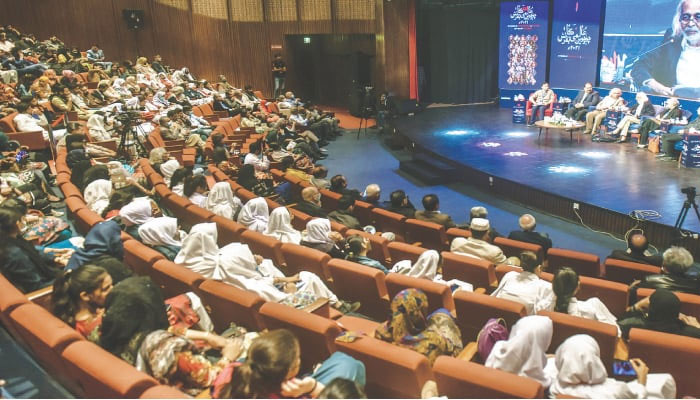‘Public education sector is no longer capable of delivering’
Addressing a session titled ‘75 Years of Education’, which was a part of the 14th International Urdu Conference organised by the Arts Council of Pakistan, Karachi, educationists stressed the need for a major overhaul of the country’s education system.
The speakers also agreed that the public education sector is no longer capable of delivering because of the sheer negligence of the federal and provincial governments, while the private sector is focused on making money instead of imparting quality education.
Renowned educationist Zubeida Mustafa said the schooling of a child must be started in their mother tongue because the education of a child begins soon after their birth. From day one, children start learning in their mother tongue.
She said children initially try to know about the things at home, and then they gradually come out of their homes to understand the outer world, so we have to accept that children can learn more effectively in their mother tongue than in other languages. “Learning other languages should be encouraged, but not at the cost of the local languages.”
Advising teachers, she said they must adopt affection, kindness and the use of soft language in their teaching. Also, she pointed out, teachers should think about why children resist going to school, saying that it is because they do not feel emotionally secure.
“You can’t teach children by using harsh words and threatening them with physical punishment. Children can’t be forced to learn something until they feel emotionally secure at schools.”
She said she is completely against uniformity, because diversity in education is more important. “However, an education system that is based on the class system should be discouraged, so that everyone can avail the equal opportunity of jobs and social status.”
However, she clarified, it does not mean dragging the schools imparting better education to the level of those schools that are not functioning up to the mark.
Dr Jaffer Ahmed said that there is a complete distortion in Pakistan’s higher education system. Our decision-makers are focused on increasing the number of public universities, but at the same, they have neglected uplifting primary education, he added. “Universities aren’t for learning and teaching; they explore quality research and produce competent graduates to meet the country’s needs.”
He said universities should teach philosophy, humanities and other subjects for further enlightenment. Unfortunately, he added, higher educational institutes nowadays do not even offer admissions in these disciplines.
Prof Ejaz Ahmed Faruqi said that if one wants to check the quality of education, they should visit at least 10 schools of the private and public sectors to feel the difference in their teaching methods.
He said the teachers of government schools are not directly answerable for their teaching methods to anyone, as there is no government mechanism to check the quality of teaching.
On the contrary, he pointed out, teachers of a private school are answerable to the principal and parents, saying that this simple difference affects the quality of teaching at private and public schools.
“We should uplift the public education sector at any cost because the state is responsible for educating children aged five to 16 years, as per the constitution.”
School Education Secretary Ghulam Akbar Laghari said: “We have competent people, but they don’t know how to teach. Therefore, there’s a need to uplift teacher trainings. Now
education systems across the globe run through a child-centred approach. That’s why we have to spend our energies on children’s learning.”
-
 Woman Jailed Over False 'crime In Space' Claim Against NASA Astronaut
Woman Jailed Over False 'crime In Space' Claim Against NASA Astronaut -
 James Van Der Beek’s Close Pal Reveals Family's Dire Need Of Donations
James Van Der Beek’s Close Pal Reveals Family's Dire Need Of Donations -
 Prince William And Harry's Cousins Attend 'Wuthering Heights' Event
Prince William And Harry's Cousins Attend 'Wuthering Heights' Event -
 Hailey Bieber Turns Heads Just Hours After Major Business Win
Hailey Bieber Turns Heads Just Hours After Major Business Win -
 King Charles' Andrew Decision Labelled 'long Overdue'
King Charles' Andrew Decision Labelled 'long Overdue' -
 Timothee Chalamet 'forever Indebted' To Fan Over Kind Gesture
Timothee Chalamet 'forever Indebted' To Fan Over Kind Gesture -
 Columbia University Sacks Staff Over Epstein Partner's ‘backdoor’ Admission
Columbia University Sacks Staff Over Epstein Partner's ‘backdoor’ Admission -
 Ozzy Osbourne's Family Struggles Behind Closed Doors
Ozzy Osbourne's Family Struggles Behind Closed Doors -
 Dua Lipa Claims Long-distance Relationship 'never Stops Being Hard'
Dua Lipa Claims Long-distance Relationship 'never Stops Being Hard' -
 BTS Moments Of Taylor Swift's 'Opalite' Music Video Unvieled: See Photos
BTS Moments Of Taylor Swift's 'Opalite' Music Video Unvieled: See Photos -
 Robin Windsor's Death: Kate Beckinsale Says It Was Preventable Tragedy
Robin Windsor's Death: Kate Beckinsale Says It Was Preventable Tragedy -
 Rachel Zoe Shares Update On Her Divorce From Rodger Berman
Rachel Zoe Shares Update On Her Divorce From Rodger Berman -
 Kim Kardashian Officially Takes Major Step In Romance With New Boyfriend Lewis Hamilton
Kim Kardashian Officially Takes Major Step In Romance With New Boyfriend Lewis Hamilton -
 YouTube Tests Limiting ‘All’ Notifications For Inactive Channel Subscribers
YouTube Tests Limiting ‘All’ Notifications For Inactive Channel Subscribers -
 'Isolated And Humiliated' Andrew Sparks New Fears At Palace
'Isolated And Humiliated' Andrew Sparks New Fears At Palace -
 Google Tests Refreshed Live Updates UI Ahead Of Android 17
Google Tests Refreshed Live Updates UI Ahead Of Android 17




